Keeping a small marine fish aquarium can be an enjoyable experience. However, it is much more difficult to maintain, compared with a freshwater aquarium. In this guide, we will cover something about small marine fish. For instance, small marine fish species for aquariums and care guides on small marine fish.
Content Table
List of Small Marine Fish Species for Aquariums
Featuring various colors and patterns, small marine fish are popular options for aquarium enthusiasts. The captivating and colorful creatures bring the beauty of the ocean into the confines of our homes. Whether you are a beginner or an experienced aquarist, these small marine fish can provide hours of enjoyment as you observe their interactions, learn about their natural behaviors, and create a thriving ecosystem within your home.
Next, we will list some popular small marine fish species.
| Clownfish | Goby | Blenny |
| Firefish | Damsel | Royal Gramma |
| Cardinal fish | Chromis | Mandarinfish |
By the way, if you want to learn more about saltwater fish for beginners, you can go to The Easiest Fish to Take Care Of For Saltwater Tank Beginners.
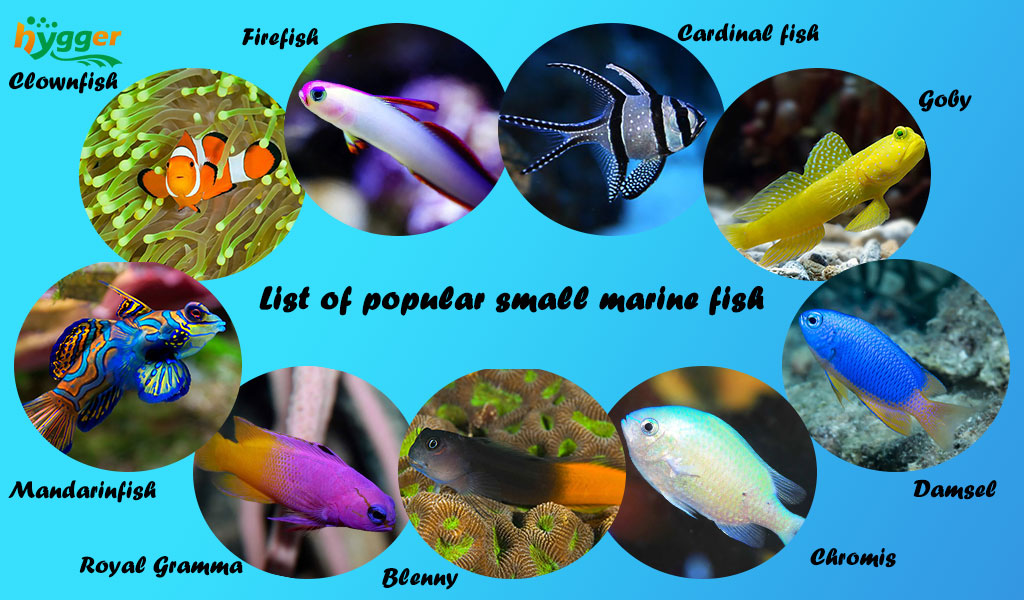
Take Care of Small Marine Fish
Aquarium environment
Small marine fish are fond of aquariums with adequate places and swimming space. Furthermore, to mimic the natural habitat, it is important to provide a suitable substrate, live rock, corals, and other decorations.
Ideal water parameters
Small marine fish are sensitive to changes in water quality, so it’s important to maintain stable water parameters within their acceptable range. This includes monitoring and keeping appropriate levels of water temperature, pH, salinity, ammonia, nitrite, and nitrate levels. The below gives some common references.
| Water temperature | 75-82℉ (24 °C to 28 ℃) | Ammonia level | 0 ppm |
| pH level | 8.0-8.4 | Nitrite level | 0 ppm |
| Salinity level | 1.020-1.025 | Nitrate level | Less than 20 ppm |
Regular maintenance
Regular maintenance is critical for the health of small marine fish. This includes routine water changes, monitoring of water quality and fish behavior, cleaning of filters and equipment, etc. Given below are some pointers.
- Routine water changes: Generally, change 15-30 percent of water once a week. A siphon vacuum pump can change the water quickly by pressing the siphon ball. Also, it can clean every corner of your tank.
- Monitor the water quality: Check the pH, nitrite, nitrate, total alkalinity, carbonate root, and free chlorine levels once a week. The aquarium water test strips will help you keep track of the water parameters.
- Filter maintenance: Rinse the filter media and clean the aquarium filter once a month.
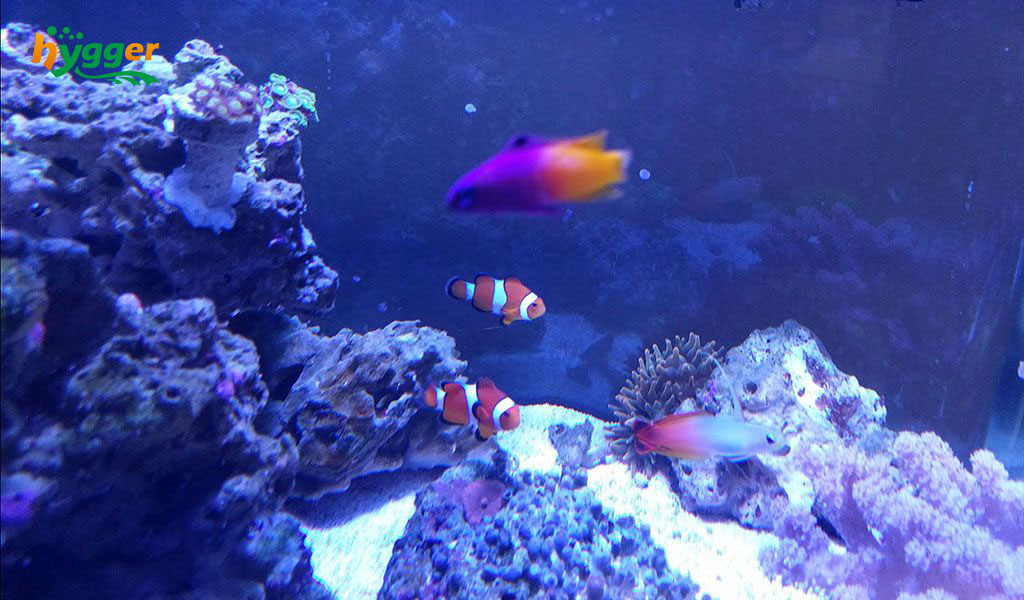
Diet & Feeding
Small marine fish should be fed a balanced diet that meets their nutritional needs. Their diet can include a variety of high-quality dry and frozen foods, as well as occasional live foods like brine shrimp or copepods. Furthermore, algae and plant matter can also be food sources.
Commonly, you’d better feed them once or twice each day, and make sure that they can finish eating within about 2–3 minutes. Plus, carnivorous or omnivorous fish may have different diet requirements. Hence, just make the diet schedule according to the specific saltwater fish.
Compatibility
When selecting tank mates for small marine fish aquariums, compatibility with other species should be the first point that comes into your mind. Some species may be aggressive or territorial, while others may be more peaceful and compatible with a wide range of tank mates. For instance, some small marine fish can be a great addition to saltwater community tanks, like Clownfish, Royal Gramma, and Firefish goby.
Necessary aquarium equipment – Choose according to your tank status
- Aquarium heater – avoid water temp fluctuation
A stable water temperature is essential for saltwater aquariums. Otherwise, fish, coral, or other creatures may face death. Consequently, to maintain a stable water temperature, adding an aquarium heater is necessary.
- Aquarium light – Provide proper lighting
Adding an aquarium light is necessary. It makes sure the plant photosynthesis and enhances the fish’s body color. Also, adequate lighting is beneficial for coral growth. Keeping the light on for about 8–14 hours each day is applicable. And most marine tanks need more blue light.
- Aquarium filtration – Build a great filtration system
To keep great water quality, adding an aquarium filter is essential. It can remove excess waste and toxic substances, such as ammonia, nitrates, and nitrates. And mechanical and biological filtration helps to keep the water clear.
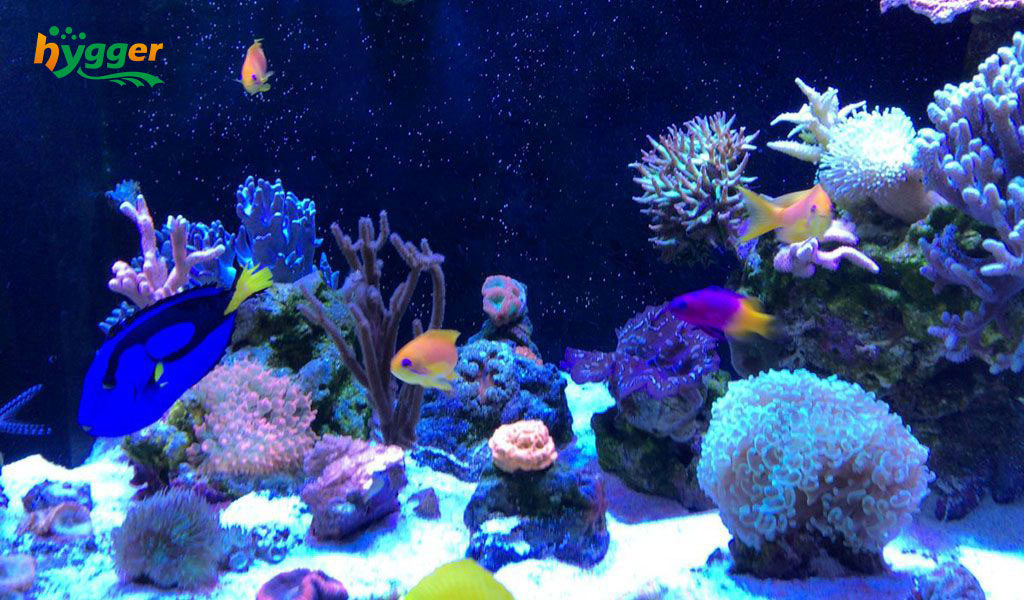
- Wave maker
A wave maker can create water movement and then help to remove the fish feces, debris, and other substances. As water circulation improves, the oxygen level will be higher. Aside from that, the wave maker can simulate ocean currents so that the tank inhabitants can feel the washing of ocean currents as freely as they live in the sea. By the way, if you have a large aquarium, you should prepare a cross-flow wave pump.
- Protein skimmer
Is a protein skimmer necessary for a marine aquarium? A protein skimmer can decrease the protein and ammonia levels, but improve the dissolved oxygen level and purify the water. Hence, it helps to keep excellent water quality. Moreover, one tip here: you should turn off the protein skimmer when you are feeding. Or the skimmer would remove the protein necessary for coral.
- Water pump
Coral may become poor in health because of water movement deficiency. In this case, a water pump can help you out. It creates water movement, which enables aeration by mixing the water on the surface and the rest.
If you do not know how to choose a water pump, you can read the Selection Guide of Water Pump for Marine Aquarium.
Signs of Healthy Small Marine Aquarium Fish
During daily maintenance, do you know how to determine whether the fish are healthy or not? If your answer is negative, just read on. In this segment, we will cover several aspects to tell the health of small marine aquarium fish.
| Aspects | The status of fish health |
| Behavior | 1. Healthy fish: active /swim freely /explore the tank /interact with tank mates 2. Unhealthy fish: inactive and stay at the bottom of the fish tank |
| Breathing | Unhealthy fish: labored or rapid breathing /gasp for air on the water surface |
| Colors | 1. Healthy fish: vibrant and well-defined colors (except some species may naturally have subdued or camouflaged coloration) 2. Unhealthy fish: color fading |
| Eyes | Healthy fish: clear eyes /no cloudiness or unusual discharge |
| Fins & Scales & Gills | 1. Healthy fish: Intact fins and scales /clean and clear gills 2. Unhealthy fish: visible wounds /damaged fins /missing scales /excessive mucus, parasites, or discoloration on gills |
| Body | Unhealthy fish: bloating /lesions /unusual lumps |
| Appetite | 1. Healthy fish: active and robust appetite 2. Unhealthy fish: loss of appetite |
| Swimming patterns | 1. Healthy fish: swim smoothly and effortlessly 2. Unhealthy fish: swimming irregularly (e.g. erratic movements, listing to one side, or continuously hiding) |
Small Marine Fish Facts
Until now, have you gained a better understanding of small marine fish? In this part, let’s take a look at some interesting facts about small aquarium marine fish.
- Clownfish are among the most popular small marine fish for aquariums. They are known for their bright colors and playful personalities. Also, they have a symbiotic relationship with sea anemones.
- Gobies are a diverse group of small marine fish that come in various colors and patterns. Some species of gobies have a symbiotic relationship with cleaning shrimp.
- Featuring quirky personalities and odd-shaped bodies, some species of blennies can change color to blend in with their surroundings.
- Mandarin fish are known for their unique appearance. They are a popular choice for reef aquariums. They require a specialized diet of copepods and other small crustaceans.
- Cleaning behavior: Some small marine fish, like cleaner gobies and cleaner wrasses, exhibit cleaning behavior in aquariums. They pick parasites and dead skin off larger fish, providing a natural cleaning service.

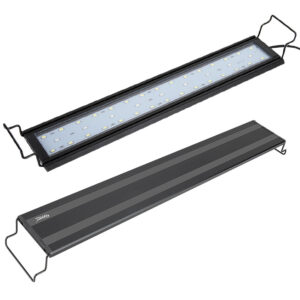
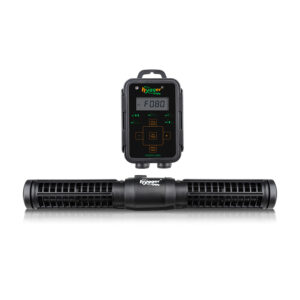
Leave a comment